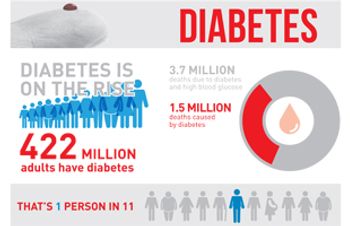
Diabetes
Latest News
Latest Videos

CME Content
More News

Medicare is alleging laboratories improperly billed the government for improper tests; time is running out for children receiving healthcare from CHIP; the AMA extends its diabetes prevention model to Maryland and other states.

This week, the top managed care news included coverage from the 59th American Society of Hematology Annual Meeting and Exposition; recommendations on the use of diabetes drugs with cardiovascular indications; and a new study found that despite changes in insurance plans to give consumers more clout, unnecessary medical spending remains a problem.

A chief medical officer for a major payer outlines the challenges making sure that certain high-cost therapies are directed to the patients who need them.

An analysis of behaviors, community environment, policy, clinical care, and outcomes data has found a disturbing trend in mortality in the United States, with premature deaths, drug deaths, and cardiovascular deaths all increasing.

From the Editor in Chief


The payment reform movement has changed the thinking about what can be done for patients with diabetes and heart failure, for the good of patients.

CMS can take steps to raise awareness, including a specific quality measure, to ensure that testing occurs prior to nontraumatic amputation.

The cost of insulin has been a major policy issue in recent years. FDA Commissioner Scott Gottlieb, MD, said the approval of a new choice in insulin was a sign of his commitment to giving patients lower-cost options.

A presentation at the fall live meeting of the ACO & Emerging Healthcare Delivery Coalition® focused on the clinical and economic consequences of not meeting glycemic goals in patients with type 2 diabetes.

The American Diabetes Association update has recommendations that affect liraglutide, canagliflozin, and empagliflozin.

AJMC provides a look at some of the updates coming out of the FDA this week, from new guidance on digital health oversight to multiple new drug approvals.

Semaglutide, Novo Nordisk’s once-weekly glucagon-like peptide-1 (GLP-1) receptor agonist for type 2 diabetes (T2D), received FDA approval Tuesday, after beating its rival in a head-to-head trial and coming to the approval process with proof of cardiovascular benefits already in hand.

On December 5, 2017, FDA approved Novo Nordisk’s semaglutide, a once-weekly glucagon-like peptide-1 (GLP-1) receptor agonist for the treatment of type 2 diabetes. Todd Hobbs, MD, Novo Nordisk’s vice president and chief medical officer, spoke with The American Journal of Managed Care® just ahead of FDA’s action.

Sanofi’s newest insulin met its primary objective in a large head-to-head trial that compared it with its chief competitor.

Every week, The American Journal of Managed Care® recaps the top managed care news of the week, and you can now listen to it on our podcast, Managed Care Cast.

This week, the top managed care news included a new proposal from CMS that insurers warn will cause confusion; a new review examines the prevalence and cost of chronic conditions in Medicaid; and a study finds 42% of all new US cancer cases in 2014 were due to potentially modifiable exposures.

Liver and endometrial cancer accounted for high numbers of new cases; increases of these cancer types have been attributed to rising rates of diabetes and obesity.

High prevalence of chronic conditions has been a key driver of healthcare costs in the United States, and Medicaid beneficiaries tend to have higher rates of chronic diseases than people not on Medicaid.

Physicians’ response to policy changes in the Affordable Care Act show that changing cost-sharing formulas can make a difference, according to results reported by Drs. Joseph Ladapo and Dave Chokshi.

The research shows that giving patients support to keep weight off after surgery is key to maintaining diabetes remission.

Every week, The American Journal of Managed Care® recaps the top managed care news of the week, and you can now listen to it on our podcast, Managed Care Cast.

This week, the top managed care stories included a new rule from CMS to address drug costs for seniors; a campaign to get payers to fund the artificial pancreas is working; and a new survey identifies how Americans prefer to treat pain.

Diabetes prevention is about a change in lifestyle that will lead to internalized benefits that reduce risk, explained Paul Chew, MD, chief medical officer of Omada Health.

In this longitudinal comparative effectiveness study of different chronic disease self-management support approaches within 1 system, both pharmacist- and nurse-led patient-centered medical home approaches improved diabetes care.

















